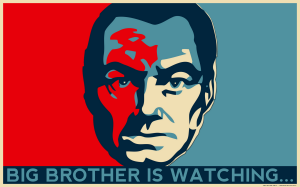Should we actually be worried about big brother and privacy as we try to engage 21st century learners in a connected environment? Is the cloud the right way to go as we begin to embrace ubiquitous learning? Are there ethical and legal implications of this new embrace to connectivity? Please reflect on what resonated with you this week and why.
Image: Nighted.deviantart.com
The three required videos were on disparate topics, so I cruised the additional readings, focusing on privacy.
I didn't follow the Edward Snowden situation when it first came out. I was aware of it. I listen to NPR. But my shallow and comfortable mental conversations sounded like, "Unless you are doing something suspicious, you have nothing to worry about. Let's see who posted for class today..." (I tend to focus on things that obviously affect me and that I can actually do something about.)
Like most aspects of technology, the laws and regulations cannot keep up with the constant innovation. The Security Now podcast made a good point. We want everything to be simple, but simplicity leads to unsecured information. NOTE: Update your computer as soon as you are notified of patches. The window between the new release and the time you update is when your computer is most vulnerable to hackers.
We want everything at the lowest cost. Some of the privacy issues revolve around targeted advertising (Solove.) In my opinion, ads are the price we pay when we have "free" access to the Internet items we consume. As we introduce technology into our schools, we are most likely to use free apps for cost savings. I know our system has received grants for hardware, but not for software or salaries for the extra technicians to keep the hardware working.
I don't see any obvious "Big Brother" issues with cloud and 21st Century learning. Closed programs like Google Classroom and Edmodo give an aura of security about student information. As long as students are following their teachers' guidelines and not seriously planning world-domination, there is no good reason for "Big Brother" to keep track of student work. The one area that could be an "issue" is parents who do not want their child to have a presence on the Internet.
It is disturbing that that US Government has created large storage facilities for huge amounts of metadata from billions of people (Gibson.) It sounds expensive. It is also disturbing that the entity that is supposed to be monitoring the activity, Congress, is being lied to... if the information about the situation is reliable. Maybe it would be OK to inform the public about the fact that the data is being collected and how, but that would cause those who don't want to be watched to figure out a way around "the system." What is right in one situation would be disastrous in another situation. It reads like a complicated espionage novel with no good solution.
Resources:
Solove, D. The Year in Privacy 2013 and the Year to Come. LinkedIn. 12/30/13.
Gibson, S. Security Now. Episode 408: Security State. TWiT. 6/12/13.
As for the required videos:
Connected Learning: All of the narrator's examples focused on things done at home, one-on-one, that cause deeper engagement. The idea of implementing her solutions sounds amazing, and would be time consuming to translate into individualized experiences for students. As the narrator implied, as long as we continue to focus on test scores, we will not spark the curiosity to create the context for learning that gets students viscerally engaged.
Internships: The students who go on "Work Study" at my Technical High School learn so much about their trade. It would be ideal to offer these kinds of experiences to every student in every school, but is it practical or possible?
RSA Animation: Fascinating take on working environments. I wish we could do distance learning for snow days! I know some schools are working on it.
Link to my
Storify this week.
